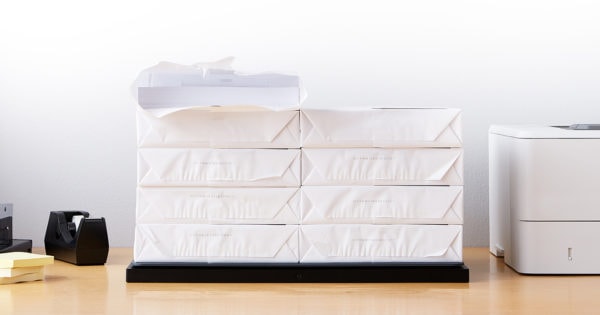
Amazon’s first iteration of the Dash button, which consumers were meant to tap to instantly order a variety of household products, didn’t quite work out the way it wanted. Mainly, people didn’t buy into it. But that hasn’t stopped the everything company from giving it the old college try again.
Amazon announced a new Dash-enabled device for business customers in the U.S., which will be available sometime next year. Called the Dash Smart Shelf, it weighs whatever is placed on it and sends low-inventory notifications or automatically reorders products when it senses that stock is running low.
To set it up, customers connect the shelf to Wi-Fi, log into their Amazon Business account, and select the product and quantity.
To sweeten the pot, Amazon is offering a 15% discount on orders from partner brands, including its private label AmazonBasics, as well as from paper companies Hammermill and Kimberly-Clark Professional, pen brand Bic, commercial products maker 3M, Kind snack bars, coffee brands Folgers and Keurig, and food and beverage brand Nestle Professional.
According to a blog post, the shelf is programmed to prevent accidental reorders if items are temporarily removed and then restocked.
Among the customers piloting the Dash Smart Shelf are noodle brand Ocean’s Halo, Red River Brewing Company and hardware program developer MBX Systems. The shelf will be available to all customers with a registered U.S. business license at an unspecified date in 2020.
If at first Amazon doesn’t succeed, it tries again
The idea behind the smart shelf is to save small- and medium-sized businesses time, but it also highlights Amazon’s habit of experimenting with technology and repurposing when necessary.
When Amazon announced the branded tap-to-reorder buttons on March 31, 2015, there was speculation it was an April Fools’ joke. By the following year, Amazon had created more than 100 buttons from a range of consumer product goods brands like Bounty, Clorox, Doritos, Huggies, Tide and Ziploc. But they never really seemed to take off with customers and, as of Aug. 31, 2019, Amazon had disabled them, though some virtual Dash buttons still remain.
This isn’t the first time Amazon has pivoted in tech. One of the platform’s most notable failures has to be its Fire Phone, which was released to much fanfare in 2014 but reportedly sold just 35,000 units and was discontinued shortly thereafter.
But, as we know, Amazon’s hardware ambitions did not end there. It has since reportedly sold 100 million smart home devices and was once again the world’s top manufacturer of smart speakers in terms of devices sold in Q3 2019.
“It’s the same thing with Dash buttons—the product didn’t work out, and the sector where it could potentially work was repurposed,” said Gartner analyst Oweise Khazi.
According to Khazi, the Amazon Alexa voice assistant is the—wait for it—prime example of the company repurposing technology. It began as a way to interact with the Amazon shopping cart, but customers were slow to embrace the concept.
“Amazon allows you to look at multitudes, compare products and look at reviews and Alexa takes that away—it gives you the products you ask for, which papers over Amazon’s advantage,” he said.
Now, Alexa is positioned as more of a personal assistant, which we see in product collaborations with brands like Kohler and Adobe. And the Amazon Echo smart speaker is now more of an entertainment hub and smart home controller.
Forrester analyst Sucharita Kodali also sees the Dash Smart Shelf as another Amazon experiment.
“I don’t know why a smart shelf would work better than a Dash button in a break room, and I can actually see more points of frustration and unwanted orders with a smart shelf than with a Dash button, but there’s no harm in their trying this—and it fits their experimentation history,” she added.
Khazi, too, was skeptical about whether the Dash Smart Shelf is the right fit for widespread b-to-b adoption, but said it could be impactful for smaller, mom and pop-type businesses.
https://www.adweek.com/digital/amazon-dash-smart-shelf-tap-free-business-orders/

